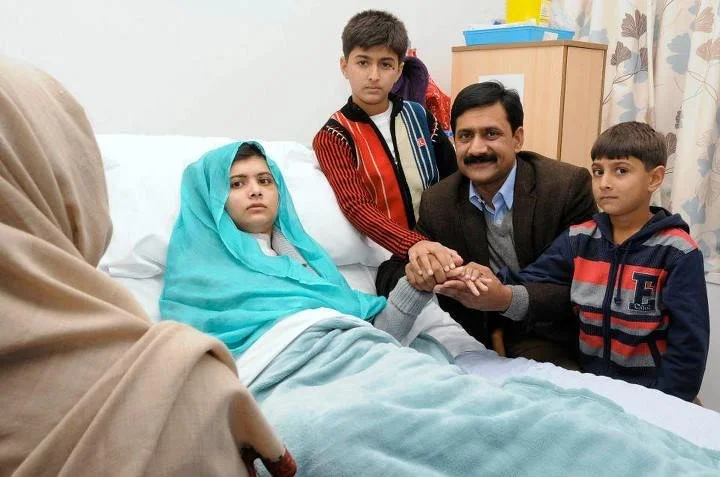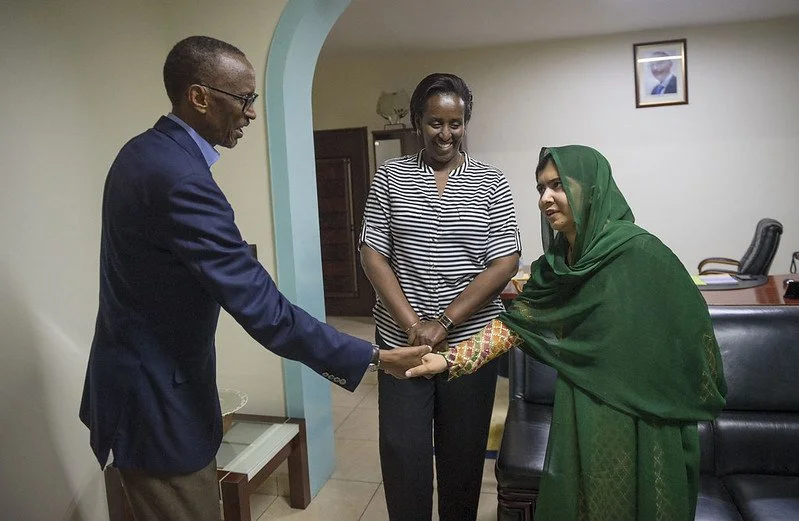Malala was born on 12 July 1997 in the Swat District of Pakistan's northwestern Khyber Pakhtunkhwa province into a lower-middle-class family, the family did not have enough money for a hospital birth and Yousafzai was born at home with the help of neighbours. She was given her first name Malala meaning "grief-stricken".
Yousafzai was educated mostly by her father, Ziauddin Yousafzai, a poet, school owner, and an educational activist himself, running a chain of private schools known as the Khushal Public School.
In Swat, the Pakistani Taliban had set an edict that no girls could attend school after 15 January 2009. They had already blown up more than 100 girls' schools. The night before the ban took effect was filled with the noise of artillery fire, waking Yousafzai several times.
In 2011, Yousafzai trained with local girls' empowerment organisation, Aware Girls, run by Gulalai Ismail, whose training included advice on women's rights and empowerment to peacefully oppose radicalisation through education. In October 2011, Archbishop Desmond Tutu, a South African activist, nominated Yousafzai for the International Children's Peace Prize of the Dutch international children's advocacy group.
At 17 years old, Malala Yousafzai received the Nobel Peace Prize for championing the right of every child to access education. Her journey took a dark turn when the Islamic Taliban movement seized control in 2008, leading to the destruction of girls’ schools. During this turbulent time, Malala documented her experiences in a diary, which was later published by BBC Urdu in 2009. In her writings, she bravely spoke against the oppressive Taliban regime. An American documentary catapulted her into international stardom.
However, fame came at a steep price. The Taliban soon issued life threats, and in 2012, Malala was shot in the head by a Taliban gunman while aboard a school bus. Remarkably, she survived but was forced to seek refuge in England, where she lived in exile due to a fatwa against her.
Following her recovery, Yousafzai emerged as an even more prominent champion for educational rights. Stationed in Birmingham, she joined forces with Shiza Shahid to establish the Malala Fund, a non-profit organisation dedicated to this cause. In 2013, she collaborated on the well-known book I Am Malala, which skyrocketed to international bestseller status. The same year, she was honoured with the Sakharov Prize, and in 2014, she jointly received the Nobel Peace Prize alongside Kailash Satyarthi from India, making her the youngest Nobel laureate at just 17 years old. In 2015, she became the focus of the Oscar-shortlisted documentary He Named Me Malala. Time magazine recognized her influence by listing her among the world's most impactful people in their 2013, 2014, and 2015 editions. Additionally, in 2017, she was granted honorary Canadian citizenship and made history as the youngest individual to address the House of Commons in Canada.
Malala has created a fund called Malala Fund, https://malala.org/malalas-story, is working for a world where every girl can learn and choose her own future. More than 122 million girls are out of school today across the world.
Malala Fund works to ensure all girls can access and complete 12 years of education. They focus on secondary school, typically grades 7–12, when gender discrimination most often causes girls to leave school. Completing secondary school opens up opportunities for girls to make their own life choices, allowing them to reach their fullest potential.
Malala has just written a 2nd book called “Finding My Way”. It is a vulnerable insight into how she was thrust onto a public stage at 15 years old and how she was made to leave her home, leading to becoming an international icon. The book deals with her subsequent anxiety and PTSD and how she has needed to balance her public life with her private need to heal and rediscover herself.
A heart wrenching but fascinating story being sold on Amazon and most book stores. Highly recommended.
“Extremists have shown what frightens them most. A girl with a book”



